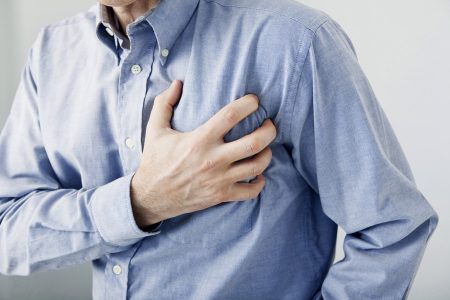
Pain in Your Chest
While this may seem obvious to some, chest discomfort is actually the top heart attack symptom that’s ignored, mainly because many people assume that it’s just acid reflux, anxiety or stress. However, if you are feeling tightness, squeezing or pressure—whether it’s in the middle or left side of your chest—you should get checked out immediately.
Difficulty Breathing
Because a heart attack happens when an artery is blocked and effects blood flow to the heart, the heart works harder to get itself oxygen, making a person feel short of breath. Similar to chest pains, this symptom is often ignored, but it’s better to contact a professional to be sure that it’s not a heart attack.
Uncomfortable Feelings in Your Upper Body
Although tightness around the neck and shoulders could be tension from stress or soreness from physical activity, they can also be signs of a heart attack. In addition to these symptoms, pain may also be felt in the back, jaw and teeth, and women have often reported a pain in their lower abdomen moments before a heart attack.
Unusual Levels of Tiredness
People who have suffered from a heart attack have reported that they felt extremely exhausted for several weeks prior to having the attack. Because the heart begins to work overtime to pump blood to its blocked area, the heart becomes tired, and as a result, can make a person tired.
Uncharacteristic Responses From Your Body
When a heart has to work overtime because of a blockage, the whole body is affected. Because of this, your body may respond by sweating, feeling nauseous or experiencing dizziness.
If you or someone near you is experiencing these symptoms, take the following steps:
- Get a phone and stay seated in a safe area
- Call 9-1-1
- Take an aspirin
- Make sure the front door is unlocked
Whether you’ve had a heart attack or think your poor health may result in one, here are steps you can take to decrease your chances of having to suffer a heart attack:
- Quit smoking
- Get out and exercise
- Make your diet colorful with fruits and veggies
- Set the goal of having a healthy weight
- Keep alcohol consumption to a minimum
- Schedule an annual appointment with a cardiologist
Whether you are living with heart disease, have a history of heart disease in your family, are the victim of a heart attack or are looking to prevent a heart attack, the team at AMS Cardiology is here for you! Call us at 215-517-1000 to schedule an appointment with one of our physicians, or visit our website today!

